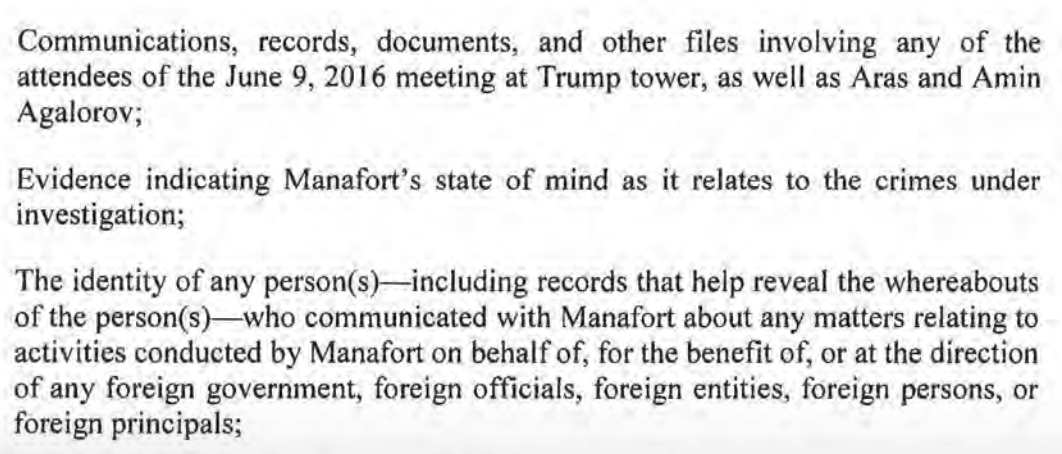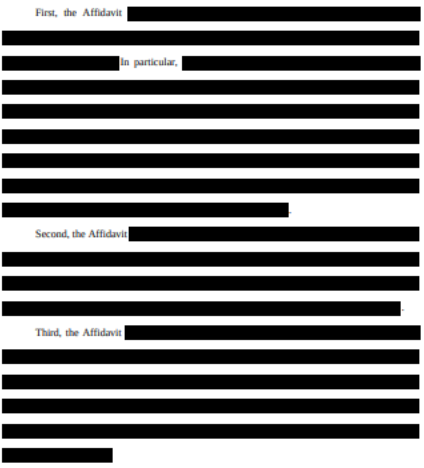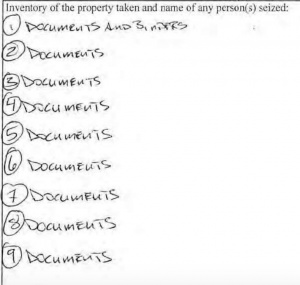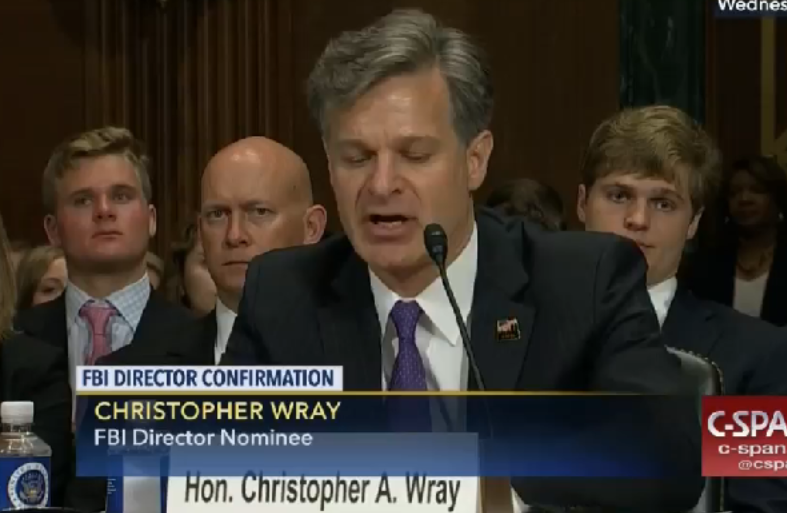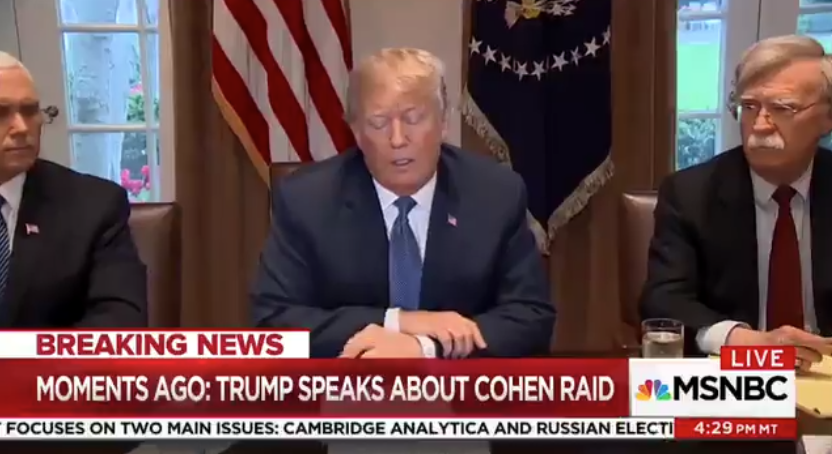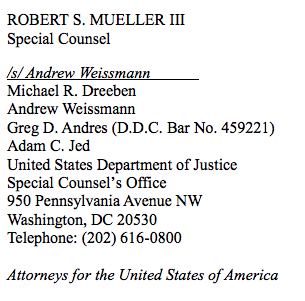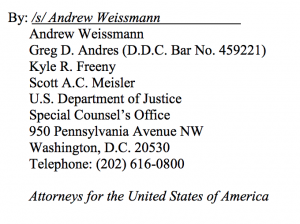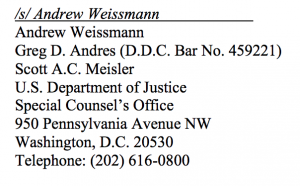As I noted, yesterday several outlets reported that among the things included in the FBI warrant for Michael Cohen’s premises was communications between Trump, Cohen, and others (whom I suspect to include Steve Bannon and Marc Kasowitz) “regarding the infamous ‘Access Hollywood'” video.
FBI agents who raided the home, office and hotel of Donald Trump’s personal lawyer sought communications that Trump had with attorney Michael Cohen and others regarding the infamous “Access Hollywood” tape that captured Trump making lewd remarks about women a month before the election, according to sources familiar with the matter.
[snip]
The search warrant also sought communications between then-candidate Trump and his associates regarding efforts to prevent disclosure of the tape, according to one of the sources. In addition, investigators wanted records and communications concerning other potential negative information about the candidate that the campaign would have wanted to contain ahead of the election. The source said the warrant was not specific about what this additional information would be.
From that, people on both the right and the left have assumed, without presenting hard evidence, that this means there must be a tie to Russia. Most often, people assume this must mean Trump somehow managed the events of October 7, when the Intelligence Committee report blaming Russia for the DNC hack, the Access Hollywood video, and the first Podesta emails all came out in quick succession.
That’s certainly possible, but thus far there’s no reason to believe that’s the case.
Mueller and Rosenstein referred this
That’s true, first of all, because after consulting with Rod Rosenstein, Robert Mueller referred this to the Southern District of New York for execution and prosecution, rather than dealing with it himself. He did that surely knowing what a sieve for leaks SDNY is, and therefore knowing that doing so would undercut his remarkably silent teamwork thus far.
In spite of a lot of reporting on this raid this week, we don’t yet have a clear understanding of why the two chose to refer it (or, tangentially, why interim SDNY US Attorney Geoffrey Berman recused himself from this matter).
There are two options. The first is that Rosenstein believed hush payments and taxi medallion money laundering sufficiently attenuated to the Russian investigation that it should properly be referred. In which case, the fact that it was referred is itself reason to believe that Mueller — even while he had abundant evidence supporting the search warrant — has no reason to believe those releases were orchestrated with Wikileaks, and therefore have no direct interest to his investigation (though they may cough up one to three witnesses who will be more willing to cooperate when faced with their own fraud indictments). In which case, the Access Hollywood video would be just another example, like the Stormy Daniels and the Karen McDougal payoffs, of Trump’s efforts to bury embarrassing news, using whatever means necessary.
The other option is that Mueller does have evidence that Trump in some way managed the October 7 events, which would be one of the most inflammatory pieces of evidence we would have heard of so far, but that there was some other reason to refer the matter.
Michael Cohen wasn’t serving as an attorney for much of the reported documents
The really good reason to refer the warrant would be so that SDNY would serve as a natural clean team, sorting through seized items for privileged communications, only to hand them back to Mueller’s team in DC once they’ve sorted through them. It’s an idea Preet Bharara and Matt Miller, among others, have floated.
Before we conclude that SDNY is only serving as a clean team for Mueller’s team here, consider that coverage has vastly overstated the degree to which the items being searched will fall under attorney-client privilege.
The search also sought information on Cohen’s taxi medallions, a business in which he has had really corrupt partners, some Russian, with their own legal problems, and one that has reportedly left Cohen with some debt problems that make his purported personal payment to Stormy Daniels all the more sketchy.
In addition, as soon as Trump claimed to know nothing of the hush payment to Daniels last Friday, the government could credibly claim that either Cohen was not representing Trump when paying off Daniels, or involved in fraud.
The NYT has reported that the raid also sought all communications between Cohen and National Enquirer’s top brass, communications that would in no way be privileged.
Even the reported communications about the Access Hollywood video may not be privileged. If they involved four people, then the only way they’d be covered by privilege is if they counted as campaign emails and Marc Kasowitz, not Cohen, was the attorney providing privileged advice in question. In that case, Cohen would have been playing the press contact role he often did during the campaign.
Still, just because Cohen was not playing the role of an attorney during most of the activities the FBI is interested in doesn’t mean the FBI won’t be really careful to make sure they don’t violate privilege, and I’m sure they’ll still use a taint team.
Mueller has already dealt with (at least) two sensitive attorney-client relationships in his investigation
Even on top of the eight members of the White House Counsel’s office who have spoken with the Special Counsel, Mueller’s team has dealt with (at least) two other sensitive attorney-client relationships.
The first was Melissa Laurenza, a lawyer for Paul Manafort whom he had write false declarations for FARA registry. Judge Amy Berman Jackson permitted Mueller’s team to ask her seven of eight proposed question after proving Manafort had used her services to engage in fraud.
More recently, we’ve gotten hints — but only hints — of what must be extensive cooperation from Skadden Arps and its partner Greg Craig, describing how Manafort and Gates laundered money to pay the firm loads of money to write a report they hoped would exonerate Ukraine’s persecution of Yulia Tymoshenko. While the cooperation of Skadden itself was probably effusive in its voluntary nature (the firm seems determined to avoid the taint that Tony Podesta’s firm has acquired in this process), Mueller did subpoena Alex Van der Zwaan and it’s unclear what methods the FBI used to obtain some of the materials he tried to hide from prosecutors.
Neither of those exchanges involves a search warrant. But they do show that Mueller is willing to take on the tricky issue of attorney testimony first-hand. Using SDNY as a clean team still may be the easiest option in the Cohen case, but Mueller clearly isn’t shying away from managing all such issues in-house in other cases.
The other possible explanations for the Access Hollywood search and the October 7 timing
Which brings us finally to the other possibilities behind the Access Hollywood search.
It’s certainly possible that the coincidental release of all these things was coordination, entirely orchestrated by the Trump campaign. But there are a number of reasons — on top of the fact that Mueller isn’t keeping this search far tighter under his own control — I think that’s not the most likely explanation.
Consider this story, arguing that the real story of Access Hollywood isn’t that it leaked on October 7 — the piece notes that David Farenthold had only received it that day — but that it didn’t leak earlier in the process, when it might have led Trump to lose the primary.
t is just impossible to believe that the tape not coming out at the start of Trump’s campaign, when logic dictates that it would have blown Trump instantly out of the water (before he was in a position where Republicans had no choice other than to keep backing him against the evil Hillary Clinton), was anything but a highly unethical political decision by someone at NBC. The fact that no one has ever even gotten an answer from NBC about how this could have happened is equally unfathomable and yet, given the news media’s overall incompetence, kind of expected.
[snip]
It has always struck me as EXTREMELY odd that it was the Washington Post, not NBC, who first released the tape on Friday Oct. 7, 2016, barely beating NBC which, it should be noted, was clearly ready to go with it immediately after the Post did. I presumed that perhaps NBC wanted this to be the case because it might take some of the focus off why they had not released it during the primaries (and thus chose not to prematurely kill off the media’s Golden Goose which was Trump’s ratings-friendly campaign).
However, there is another aspect of the Post being the outlet which got the big scoop that has always struck me as potentially very significant. The Post’s reporter, David Fahrenthold, has said that he was only made aware of the tape, via an unnamed source, THAT day — which is a clear indication that whomever was trying to get the Post to release it had decided to do so in tremendous haste. After all, if the source had planned it sooner they would have made contact with Fahrenthold well before then because he might have been out of pocket that day.
[snip]
For instance, what if it was actually someone from the TRUMP team who leaked the tape. At first glance, this seems ludicrous because no one thought that Trump would be anything but greatly harmed by the tape (though he clearly was not). But what if someone in Trump World got wind that the tape was about to be released and decided that stepping all over the Russia news (which would normally have dominated the narrative for the remainder of the campaign) would at least create the least bad outcome for them?
I don’t agree that the release was released when it was to distract from the Russia announcement that day. As I’ve long noted, in reality, the Access Hollywood distracted from the Podesta emails, effectively burying the most damning release in the bunch, the excerpts of Hillary’s speeches that even Democrats had been demanding she release since the primary. And while the Trump team might claim they didn’t control the release of the Podesta emails directly — and Roger Stone’s predictions that Wikileaks would release Clinton Foundation rather than Podesta emails were dead wrong — the Trump team at least knew something was coming (indeed, Wikileaks had made that clear themselves). So there’s little reason they would stomp on what they had long welcomed with the Access Hollywood tape. As this post alludes, I also think the Trump team and Russians or Wikileaks may have been squabbling over whether Wikileaks would release possibly faked Clinton Foundation emails that week, only to scramble when Wikileaks refused to release whatever the Peter Smith effort had gotten dealt to them.
Like the Mediate piece, I’m interested in the way that Steve Bannon had Clinton accusers all lined up to go that weekend (indeed, I noted how quickly Stone moved to that after having raised expectations for a Clinton Foundation release). But I also think there are some reasons to believe that attack was in the works for other reasons (though I agree it might reflect advance knowledge that the video might come out, or even that Stormy Daniels might come forward). Finally, I don’t think the release came from Trump because of all the reports of Republicans trying to convince Trump to step down (though it’s possible the GOP dropped the video in one last bid to get him to do so).
One alternative narrative, then, is that the real story about the Access Hollywood suppression goes back months or years earlier, as one of the things Trump managed to suppress throughout the campaign, but something happened internally to breach that agreement. And, separately, that either Assange by himself, with Russian help, or with Trump assistance, timed the Podesta emails to come out as the Russian attribution was coming out. That is, it could be that the real story remains that whoever orchestrated the Wikileaks release did so in an attempt to bury the Russian attribution, but that the coincidental release of the Access Hollywood video in turn buried the Podesta emails.
Finally, it’s possible that Democrats got ahold of the Access Hollywood video and they released it to (successfully) drown out the Podesta emails, which they (and the intelligence community) also would have known were coming, but by doing so, they also drowned out the all-important Russian attribution in the process.
The point is, we don’t know. And nothing we know thus far about the process leading to this warrant or about the suppression and release of either the video or the women’s stories suggest it all took place that week of October. Trump’s usual m.o. is about suppression, not timing.
That said, I’m curious if this raid will reveal details about one other item Trump probably tried to suppress: the nude Melania photos that NYPost released on July 31, 2016, just as campaign season got going in earnest.





